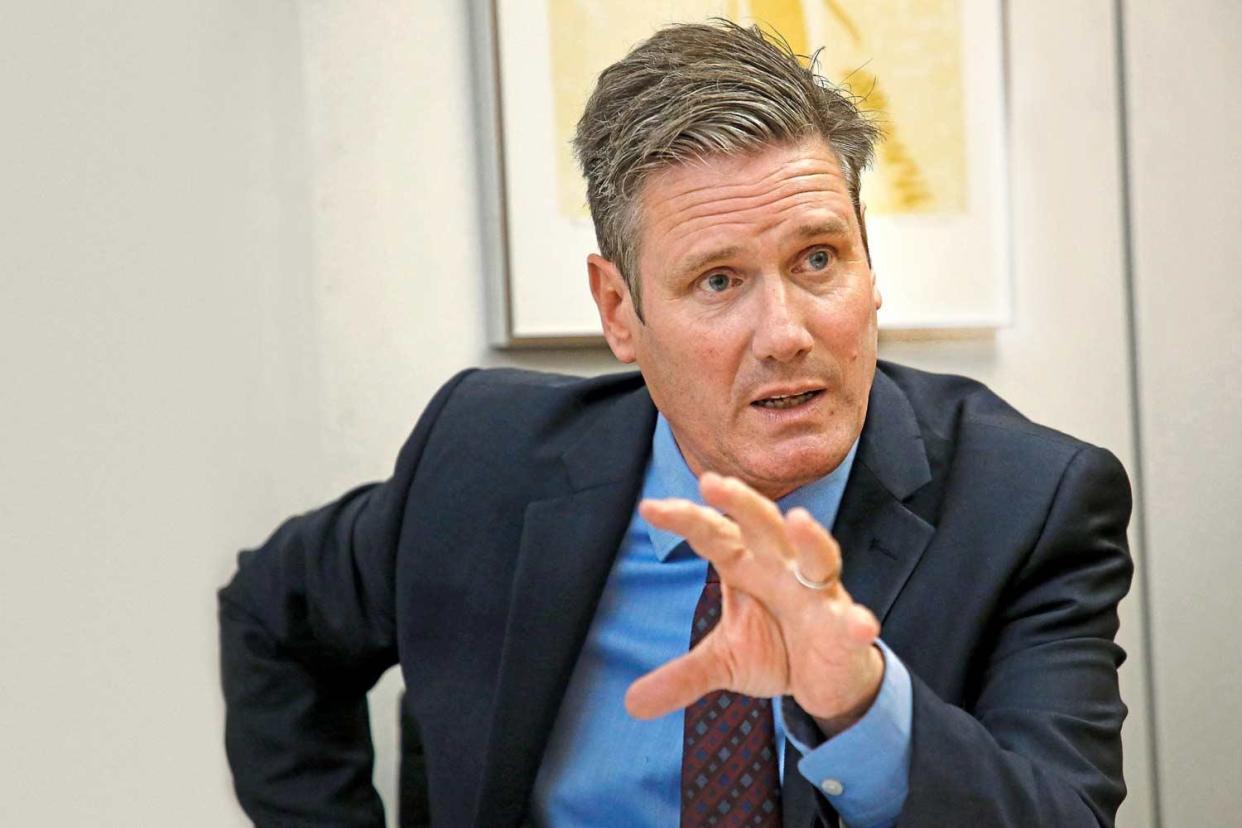Sir Keir Starmer on Brexit and how Labour is back in business

Only 15 months ago, Sir Keir Starmer walked out of Jeremy Corbyn’s front-bench team with a wounding jibe that the party was going nowhere “without a change of leader”. Reminded of his prediction, the former lawyer changes his plea without hesitation. “I was wrong about that,” he said.
Sir Keir was the rebel who agreed to come back. In a shadow cabinet dominated by Left-wingers and padded with low-calibre appointees, he stands out as a business-friendly centrist who has already run a major organisation as Director of Public Prosecutions.
As Labour delegates pack their bags for a “victory” parade at the Brighton conference this weekend, to celebrate the gains made when they lost June’s general election, Sir Keir says the toxic infighting of last autumn has gone. “I can’t emphasise to you enough just how much the mood has changed in the party,” he said. “The effect of the general election has been transformative of us as a party, and of the prospects that other people see in us.
“It’s one of the reasons businesses are coming to see us all the time.”
In his own speech on Monday, he will respond to Theresa May’s speech in Florence on Brexit. He says it is “urgent” she gives clarity to post-Brexit relations.
“She’s got to face down Boris and the fantasy Brexiteers,” he said. “She’s also got to be much more flexible about her own ideological red lines: clinging on to the idea that the Supreme Court in London will be the arbiter of any disputes about EU citizens in future is not going to work.”
But what of Labour’s own red lines, artfully blurred in the party’s manifesto? Sir Keir had a success in the summer when he delicately herded Corbyn and the major unions behind a jobs-friendly policy of staying in the European single market and the customs union during a transition phase of, probably, two years. “On transitional arrangements, it is impossible to be clearer than we are,” he said smugly.
Asked what the permanent trade relationship might look like, however, he is less clear. He rejected the phrase “soft Brexit” which deputy leader Tom Watson has used. “I’m not sure hard and soft actually help any more,” he said. “They mean different things to different people. I say that we are the party that is putting jobs and the economy first.”
So would he keep Britain in the single market? Sir Keir responds with a lawyerly argument that “that status has to change” by virtue of leaving the EU, but refuses to be pinned down to a simple “in” or “out”.
What about the EU’s freedom of movement rules? “Freedom of movement and the referendum were bound up, and I have always accepted that,” he said. “Therefore the rules are going to have to change. There’s a big question as to what goes in its place.”
Asked what these changes might be, Sir Keir said refugees and students should be stripped from migration statistics, on the grounds that both should be welcomed.
For EU workers, he said, free movement rules already allowed some leeway in practice. “The actual rule as it stands is you can move across a border for three months, after which you must be in a job or able to support yourself.
“That would be a good starting place, it seems to me, for a discussion about immigration policy.”
The idea, which Sir Keir stressed is not policy, comes at a time Labour is wrestling with its own tensions over Brexit, including a clash between MPs in Leave-backing regions, whose voters are demanding tougher immigration controls, and London MPs keen to avoid ditching free movement. A similar suggestion was made in the summer by Labour MPs opposed to Brexit, including Chuka Umunna, in a bid to prevent Labour junking free movement and so losing a chance to stay in the single market. That may be Sir Keir’s intention.
The MP for Holborn & St Pancras, rumoured to have inspired the character of handsome barrister Mark Darcy in the Bridget Jones books, sees his role as “bringing people together”. Although sympathetic to skills-starved businesses, he accuses some of having “exploited the rules to bring in cheap labour”. He adds: “It has been too easy for us all to avoid addressing the skills gap because it has been too easy to buy them in.”
What of Tom Watson’s Newsnight interview that stated that under Labour the single market and customs union could become “permanent”? He slaps down the deputy leader firmly, saying: “I wouldn’t read too much into that.”
He says he gets on “fine” with Mr Corbyn’s close circle like Seumas Milne, and praises policy chief Andrew Fisher for honing the manifesto. He has not met Tony Blair, Labour’s most senior pro-European, since becoming an MP.
On the row over Sadiq Khan being denied a speech to the conference hall, Sir Keir refuses to take sides. “Sadiq is a really significant and important voice,” he said. “He will be at conference, making speeches ... on the platform or not. It’s a matter for Jeremy and his team how they want to run conference.”
He and Khan are both tipped as future leaders. Is a Khan v Starmer contest a possibility? “We are good friends and he has been a fantastic mayor,” he grinned.
Would he rule himself out as a leadership contender? “We’ve got a leader,” he said, neither denying nor confirming his ambition. “It is not a live issue.”

 Yahoo News
Yahoo News 
